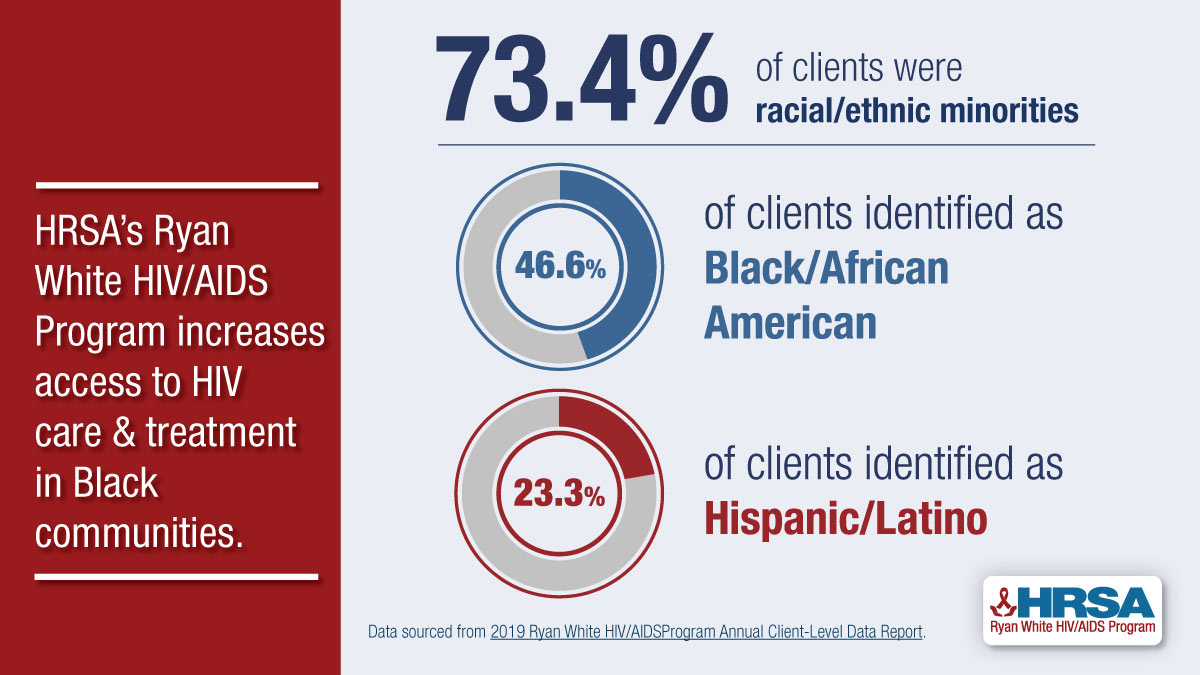HRSA Observes National Black HIV/AIDS Awareness Day
Topics

Each year on February 7, the Health Resources and Services Administration’s (HRSA) HIV/AIDS Bureau (HAB) and federal agencies across the U.S. Department of Health and Human Services recognize National Black HIV/AIDS Awareness Day (NBHAAD). This observance is an opportunity to increase awareness about HIV education, testing, and care and treatment services among the Black/African American community, as well as highlight the work done to reduce HIV in these communities across the U.S.
HRSA’s Ryan White HIV/AIDS Program
For three decades, HRSA's Ryan White HIV/AIDS Program (RWHAP) has funded grants to cities, counties, states, and local community-based organizations and clinics to provide a comprehensive system of HIV primary medical care, essential support services, and medications for low-income people with HIV. In 2019, nearly 568,000 individuals received care through the RWHAP. Approximately three quarters of these individuals were from racial/ethnic minority populations with more than 46% identifying as Black/African American. Of the Black/African American clients served by RWHAP, about 44% are aged 50 years and older.
In 2019, a record-high 85.2% of Black/African American clients receiving care through the RWHAP were virally suppressed—meaning they have an undetectable viral load and effectively no risk of sexually transmitting the virus to an HIV-negative partner.
While this is encouraging news, we know there is still more work to be done to reduce heath disparities among RWHAP clients. Not all people and communities are impacted equally by HIV, so the RWHAP continues to focus efforts on key populations where HIV is most concentrated—including Blacks/African Americans, especially young, Black/ African American men who have sex with men (MSM), and young Black women. The goal is to ensure individuals in these key populations are getting tested for HIV, and getting access to necessary care, treatment, and medication if they test positive for HIV.
We are also funding RWHAP Part F Special Projects of National Significance Program initiatives to help improve HIV outcomes for Black men and women, including initiatives to:
- Design, implement, and evaluate interventions that improve care and treatment coordination for black women with HIV. (Funded with support from the Minority HIV/AIDS Fund.)
- Develop evidence-based behavioral health models to retain black MSM in HIV medical care and supportive services.
The findings from these projects will support the development of innovative strategies of HIV care and treatment that can help address the needs of RWHAP Black/African American clients.
We also recognize the key role health care providers have in caring for people with HIV. Our RWHAP AIDS Education and Training CentersExit Disclaimer offer tailored trainings to increase capacity for minority providers and providers who treat minority patients. Through our In It Together Health Literacy Project, we developedtrainings specifically for health professionals serving Black/African American gay, bisexual, and other MSM. These resources are available on the TargetHIV websiteExit Disclaimer.
In honor of NBHAAD, we encourage you to learn more about the RWHAP and the resources available to improve HIV outcomes for the Black community.
Learn More:
- HRSA HIV/AIDS website: https://hab.hrsa.gov
- AIDS Education and Training Centers: https://aidsetc.orgExit Disclaimer
- HRSA’s Ryan White HIV/AIDS Program – By the Numbers – 2019: https://hab.hrsa.gov/sites/default/files/hab/Publications/infographics/RWHAP-HRSA-by-the-numbers-2019.pdf
- 2019 RWHAP Client-Level Data Report: https://hab.hrsa.gov/sites/default/files/hab/data/datareports/RWHAP-annual-client-level-data-report-2019.pdf